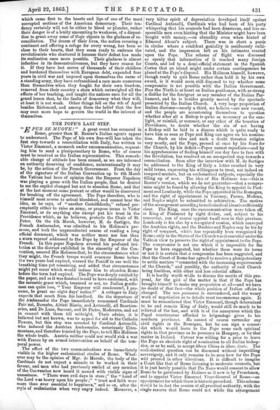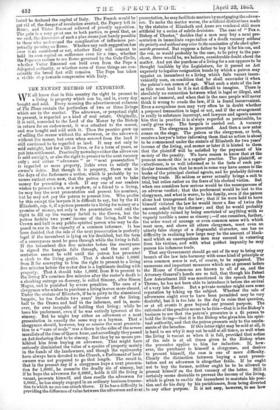THE POPE'S LAST STEP.
"Et PUB SE MUOVE I " A great event has occurred in Rome, greater than M. Renter's Italian agents appear to understand. The Pope of his own free-will has taken the first step towards a reconciliation with Italy, has written to Victor Emanuel, a monarch under excommunication, request- ing him to send a plenipotentiary to Rome, who of course must be received as the Italian representative. This remark- able change of attitude has been caused, as we are informed on authority deserving of confidence, unintentionally it may be, by the action of the French Government. From the day of the signature of the Italian Convention up to 4th March the Vatican had been of opinion that the Emperor Napoleon was playing a game with the Italian people, that he desired
to see the capital changed but not to abandon Rome, and that at the last moment some pretext or other would be discovered for breaking off the agreement. The Pope therefore, who is himself most averse to actual bloodshed, and cannot bear the idea, as he says, of "another Castelfidardo," refused per- emptorily either to raise an army, or propose terms to Victor Emanuel, or do anything else except put his trust in the Providence which, as he believes, protects the Chair of St. Peter. On the 4th March, however, M. de Sartiges, the French Ambassador, was admitted to his Holiness's pre- sence and took the unprecedented course of reading a long official document, which was neither more nor less than a stern reproof addressed to the Pope by the Emperor of the French. In this paper Napoleon avowed his profound irri- tation at the distrust exhibited in the sincerity of the Con- vention, assured His Holiness that, be the circumstances what they might, the French troops would evacuate Rome before the two years had expired, warned the Pontiff to use well the breathing time yet remaining, and added that circumstances might yet occur which would induce him to abandon Rome before the term had expired. The Pope was deeply excited by the paper, and as it was finished is said to have exclaimed, with the sarcastic grace which, tonsured or not, no Italian gentle- man can quite lose, "Your Emperor will condescend, I pre- sume, to grant me eight days' notice ?" A cottager in Italy expects that much from his landlord. On the departure of the Ambassador the Pope immediately summoned Cardinals Pat, Barnabo, Altieri Riario, and Antonelli, all Reaction- aries, and Be Luca, Sacconi and Di Pietro, Moderates, and sat in council with them till midnight. Their advice, it is believed but not known, was to appeal for aid to the Catholic Powers, but this step was arrested by Cardinal Antonelli, who induced the Austrian Ambassador, notoriously Ultra- montane, and therefore trusted by the Pope, to tell His Holiness the whole truth. Austria neither could nor would risk a war with France by an armed intervention on behalf of the tem- poral power.
The effect of the two communications was immediately visible in the higher ecclesiastical circles of Rome. What- ever may be the opinion of Mgr. de Merode, the body of the Cardinals do not expect a miracle to be worked in their favour, and men who had previously smiled at any mention of the Cohvention now heard it named with visible signs of uneasiness. "There were evil days in store ;" the "hand of the Lord was heavy upon his people ;" "trust and faith were more than ever essential to happiness," and so on, after the styie of ecclesiastics when very angry indeed. Moreover, a very bitter spirit of depreciation developed itself against Cardinal Antonelli, Cardinals who had been of his party whispering that his counsels had been disastrous, and less re- sponsible men even hinting that the Minister might have been bought with money,—an absurdity even when hinted of Edmond About's subject. There was in short a panic in circles where a confident geniality is assiduously culti- vated, and the impression left on his intimates reacted upon the Pope. The scheme of flight was discussed so openly that information of it reached many foreign Courts, and led to a demi-official statement in the Spanish Cortes that an island might under certain contingencies be placed at the Pope's disposal. His Holiness himself, however, though ready to quit Rome rather than hold it by his own sword, is it would seem still disposed to try whether some compromise is not possible with the Italian Government. Pius the Ninth is at heart an Italian gentleman, with as strong a dislike for the foreigner as any member of the Italian Par- liament, and he is besides greatly moved by the spectacle presented by the Italian Church. A very large proportion of Italian dioceses—nearly a third, we believe--are now vacant, and the people are accustoming themselves to question whether after all a Bishop is quite as necessary as the sun- light, or rainfall, or summer, or any other of the bounties of Providence, to doubt whether the sin of not having a Bishop will be laid to a diocese which is quite ready to have him as soon as Pope and King can agree on his nomina- tion. Such an idea and such a doubt threaten religion very nearly, and the Pope, pressed at once by his fears for the Church, by his deficit—Popes cannot repudiate—and by his apprehensions of finding himself one day face to face with the Revolution, has resolved on an unexpected step towards a reconciliation. Soon after the interview with M. de Sartiges he addressed to the King of Italy a letter couched in very mild terms, expressing his willingness to treat, not indeed on temporal matters, but on ecclesiastical subjects, especially the filling up of sees. The idea of His Holiness was—this is Reuter's version, which we do not guarantee—that a compro- mise might be found by allowing the King to appoint in Pied- mont and Lombardy, while the Pope appointed in the Romagna, and the right of appointment in Tuscany, Parma, Modena, and Naples might be submitted to arbitration. The motive of the arrangement according to ecclesiastical ideasis sufficiently clear. The King, once the excommunication were taken off, is King of Piedmont by right divine, and, subject to his concordat, can of course appoint to.all sees in that province. Lombardy is his also by a recognized cession, which conveyed the Austrian rights, and the Duchies and Naples may be his by right of conquest, which has repeatedly been recognized by Rome; only in the States of the Church was it essential under the Vatican view to preserve the right of appointment to the Pope. The compromise is not one which it is impossible for the Pope to have suggested, but whether these were its terms or not it is certain that a compromise has been suggested, and that the Court of Rome has agreed to receive a plenipotentiary to settle matters "connected with the increasing requirements of the Church," and possibly, the authority of said Church being limitless, with other and less celestial affairs.
It is hardly worth while to discuss the merits of this pro- posal, for the gist of the matter is that if the Pope has brought himself to make any proposition at all—and we have no doubt of that fact—the whole position of Italian affairs is changed. The non palms-nits is surrendered, and the weary work of negotiation as to details must recommence again. It must be remembered that Victor Emanuel, though determined to be and remain King of -Italy, would still do much to be relieved of the ban, and with it of the annoyance which the Papal countenance afforded to brigandage gives to his southern provinces. He cannot of course surrender any civil rights in the Romagna, but he can sign a concor- dat which would leave to the Pope some such spiritual rights in that province as he possesses in Hungary, or for that matter in Ireland. Cavour was willing for a price to leave the Pope an absolute right of nomination to all Italian bishop- rics, or as he said, to accept libera Chiesa in libero Stab). The ecclesiastical question can be discussed without imperilling sovereignty, and it only remains to be seen how far the Pope will proceed in other directions. It is difficult to imagine a Court like that of Rome listening to moderate counsels, but it is just barely possible that Pio None would consent to allow Rome to be garrisoned by Italians as it now is by Frenchmen, and to appoint Victor Emanuel Vicar-General of Rome—an appointment for which there is historic precedent. This scheme would be in fact the cession of all practical authority, with the single reserve that Rome could not while the arrangement lasted be declared the capital of Italy. The French would be got rid of the danger of revolution averted, the Papacy left in Rome, and Victor Emanuel relieved of priestly opposition. The gain is a very great one to both parties, so great that, as we said, the discussion of such a plan seems just barely possible to those who understand the complication of influences per- petually pressing on Rome. Whether any such suggestion has ever in en considered or not, whether Italy will consent to hold its own capital on sufferance even for a time, whether the Pope can endure to see Rome governed by the Code Civile, whether Victor Emanuel can hold even from the Pope a delegated authority, or whether none of these things are con- ceivable the broad fact still remains. The Pope has taken a visible step towards compromise with Italy.































 Previous page
Previous page